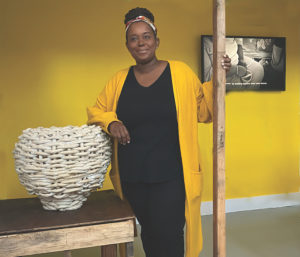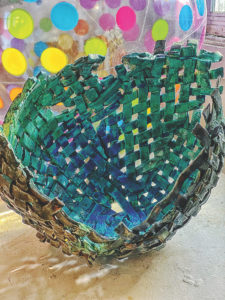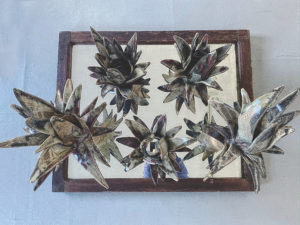
Provincetown in winter has been a different experience for Fine Arts Work Center visual arts fellow Anina Major. From Nassau in the Bahamas, Major is interested in the sense of identity in communities that depend on attracting visitors to survive, such as the Bahamas and the Outer Cape. A key difference between the Bahamas and the Cape as vacation destinations, however, is the existence here of a true off-season, during which locals can live and interact without the continuous presence of visitors.
“Where I am from,” Major says, “hospitality could be viewed as a multifarious performance that is directly related to someone’s livelihood, to the extent that the performance almost becomes who you consider yourself to be. And we never really get to cut that off.”
In contrast, winter in Provincetown allows Major to experience such an environment without the presence of tourists. “This gives me time to really think about the absence of that component within that ecosystem,” she says.
The title of Major’s show at FAWC, which has an opening reception this Friday, is “No Vacancy in Paradise,” which is the title of a poem written by Bahamian cultural critic Patricia Glinton-Meicholas. Major reads the last paragraph of the poem aloud — words that strike a chord with her: “No, there’s no vacancy in paradise/ we are claiming all the rooms/ willing only to lend space/ to those who take with due respect/ the role of the gracious guest.”

Though Major is a visual artist, her work is informed by a keen awareness of language and its power. Her work center exhibit is an installation with a variety of materials and modes of expression. “I consider my creative practice to be a response to continuous erasure and a culture that is constantly being oversimplified,” she says. Major wonders about the effect that this oversimplification has on the people of the Bahamas, a place marketed as “an escape” from the realities of life.
“In one of my video pieces included in my show,” Major says, “I leverage the sound from a 1950s commercial to illustrate how this can deeply affect one’s understanding of self.” The video, titled “Fragments of Epic Memories,” was initially supposed to be “just bits and pieces of normalcy.” But it ends on Sept. 1, 2019, the day that Hurricane Dorian hit the Bahamas. It was also the day Major was planning to leave the Bahamas to come to the U.S. “Of course, I wasn’t expecting a hurricane while filming, it just happened that way. So, the video ends with footage of the sky turning gray and violent waves crashing onto the roads, the same waves that you see earlier looking so calm and still. I thought that was such a beautiful metaphor for life in general.”
Major’s artwork explores and reclaims what she calls “the genuine, intricate connection” between the people of the Bahamas, their land, and the craftmanship of the objects they make, a connection that she feels is blurred, even falsified, by the ways in which her home is viewed by others.
“A lot of the information we receive about my country is contrived and marketed,” she says. “And I believe that doesn’t just influence those on the outside, it also influences those living inside the bubble being created. Before, it was others creating this image for us: notably, colonialism. But now we ourselves are engaging in the same practice that has somehow become ingrained, and how do we talk about that?”
Ceramics, the focus of Major’s recent M.F.A. studies at Rhode Island School of Design, is her material of choice for the objects she uses in her installations. “My objects counteract the theme that we only make objects so that tourists can buy them,” she says. “I’m trying to show that there is value in the practice, in this craft, beyond economics. A value that, if we’re not careful, will disappear.”
Both her parents worked when she was growing up, so Major spent a great deal of time with her grandmother, a “straw vendor” by profession, who taught her the craft of plaiting baskets to sell at the marketplace. “I participated in the performance,” Major says. “I made my little change purses, and I would go to the market and get a kick out of approaching tourists and asking, ‘You want to buy my purse for $3?’ ” She laughs. “And then I’d buy French fries for lunch.”

Major speaks of her home country being a “place of resourcefulness. Everyone is building something from nothing. The wood I use in my installations are a nod to that resourcefulness and are sourced here from houses in Provincetown.”
Today, Major blends ceramics with the skills she learned from her grandmother to create a sense of permanence in her work. “When we think about history and how we have an understanding of people and how they existed and how they lived,” she says, “it is because of ceramics.” The memory of ancient civilizations often rests in ceramic relics. “So, as a material, it serves a purpose way beyond my own existence,” Major continues. “That’s what I’m looking for. The objects my grandmother made will deteriorate. They are made from the tree palms. There’s something beautiful about me taking that practice and putting it into an object that will exist as some kind of evidence that we were here.”
Major does not live in the Bahamas year-round anymore. This displacement has created a lens through which she views her home with longing. Her FAWC show is an outgrowth of that. With it, Major aims to create “a layered, whimsical environment that the viewer can navigate and have different kinds of experiences within. My hope is that people will walk away with a connection to my work that somehow helps them to think about their own selves and some of the challenges they may face in feeling at home.”
Permanent Vacation
The event: Opening reception of exhibit of work by visual arts fellow Anina Major
The time: Friday, Feb. 7, 6-8 p.m.
The place: Fine Arts Work Center, 24 Pearl St. in Provincetown
The cost: Free



